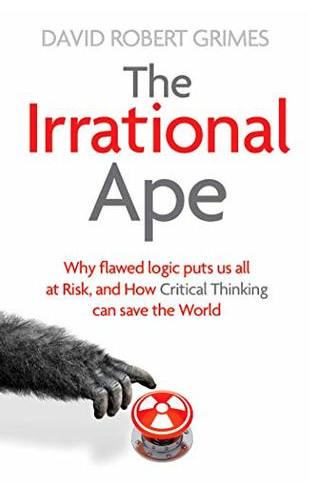
The Irrational Ape: Why Flawed Logic Puts us all at Risk and How Critical Thinking Can Save the World by David Robert Grimes
I will admit to some reluctance in the choosing of this book. To me, it smacked of being just another commentary on our world out of control and beset by what appears to be unprecedented political madness. There are a plethora of such books out there right now all offering lovely analysis with little or no prescriptive advice. As a result, I was slow in starting to read The Irrational Ape. So in simple terms, I figured this was going to be merely another good whine cloaked in some form of analysis.
However, on reading and appreciating it, the book promises an intriguing look at reason and how the human mind fails society – stepping beyond our current maladies. It extends this look at the failure of reason over time – and in this, I was grateful. The media would certainly have us believe that all that we face today is both unprecedented and extreme. This book, in some sense, effectively combats that.
It adopts a very logical and very well structured approach, supporting specific concepts with real-world historical examples. It is comprehensive but relatively well-articulated. The various pitfalls of human reasoning are introduced, contextualised and demonstrated.
The author approaches his topic with academic precision but with a tendency towards a particular repetitious rhetorical style. The chapters are well road-mapped, and after taking the reader through a single example, he offers a few more. As a result, this felt a very long and repetitious read. The author’s choice of words felt like he was revelling in his stylistic flourishes at times. He enjoys his clever craftsmanship, but this often led to a needlessly complex phraseology.
As mentioned, it is thorough, but reads long. It is well documented with examples, but it may have helped were one guided with a simple: ‘if you get it the first time skip to the next chapter because I am going to give you four more examples that don’t elaborate, but just reinforce my assertion.’ A niggling point: many of the examples appear somewhat hackneyed from being overused. It’s not that they aren’t relevant or useful, but how they are delivered makes it sound as though they are unique or original.
I will admit I don’t recall ever hearing this fellow in the Irish media. However, he certainly alludes to being quite involved with a variety of Irish public issues – I must be out of touch. He is very articulate, and the book is logically presented. It was not a bad read. Although I was familiar with many of the philosophical constructs, by no means all and I certainly learned things. There is almost too much in this single narrative for my simple mind to take in and retain. Therefore I would tend to consign it to a work that I would consult when faced with a particular circumstance rather than enjoy as a pure readable narrative – although not sure what might drive me to consult it. The author seemingly intends this as a learning tool so that we might be more critical in our thoughts, reasoning and actions, but I wonder whether he accomplishes that. As the subtitle claims, it seeks to document the flaws but to also show how critical thinking can save the world. The flaws in thinking are well exposed but I am not sure that the prescriptive side of the discussion was actually raised or attempted. I’ll leave that for your own discussion.
My subjective mark for it is based on my enjoyment as well as my measure of its construction and delivery.
